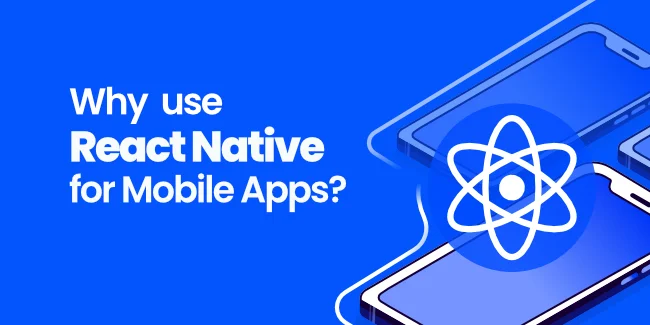Mobile Development
Technologies
Why use React Native for Mobile Apps?

If you are wondering whether it is worth using React Native to create multiplatform mobile app development, you've come to the right place. This article is for you to learn all the secrets of React Native and to make a fully informed decision.
React Native gives your app the industry-leading UI/UX design to meet even the most critical user's expectations. You also take advantage of all the incredible benefits of cross-platform applications. It's also a brilliant idea from a software development costs viewpoint. Creating an application with React Native will offer your project a realistic timeline and budget, which is excellent. These are essential aspects of any software development project.
If you're looking for a React Native development company, make sure to consider their experience. With an experienced provider, you can take advantage of all the benefits cross-platform development offers your software project! A cross-platform mobile app development company will create a successful product and take care of the logistics of running a project.
Be aware that the best product development company may be based in another country or even on a different continent. After all, no country has a monopoly on great programmers. ;-) Therefore, consider offshore outsourcing services. The most significant advantages of this option are quality, price, and time savings.
Regardless of what decision you make, knowledge about the usability of React Native will be helpful in the implementation of your projects. So we invite you to read our article.
What is React Native?
React Native is an open-source framework that can help you develop cross-platform applications faster and more efficiently. You can use React Native's speed and performance benefits by programming in JavaScript.
Thanks to React Native, you don't need to create separate codebases for Android and iOS. React will allow you to create fully functional applications for two platforms and in much less time using one code base. It affects both the project's duration and cost, as there is no need to hire two separate development teams to create two code bases.
Why should you use React Native for Mobile App Development?
React Native has many advantages that make it worth considering when choosing the right technology for mobile application development. The list below is subjective, of course, but we are sure it will help you make this difficult decision.
-
Cross-platform Development
The main advantage of React Native is that it uses the same code base for many platforms. As a result, cross-platform apps perform at the same level as native mobile apps.
React Native is a framework that uses React JS and a native UI library to write the core code of a single application that may be executed on both iOS and Android platforms.
We may replicate state management, React component logic, and other capabilities of a native app for a better mobile application with all native features. React Native lowers development time while lowering the overall cost of application development. Faster project execution means the application can be brought to market faster.
-
Reusability and components
Cross-platform mobile app development allows you to write code once and use it for iOS and Android apps. React Native works similarly, providing written code that is comfortable for developers to use. They don't have to build multiple apps for various platforms. In addition, if a firm has an existing web app, most of its code may be reused to create a mobile application. It is a huge time and money saver.
In addition, React provides native components such as text, image, and view, making your application nearly native performance.
React Native is considered easy to learn. If your developers already know JavaScript, they don't need to learn another language and code syntax anymore.
Practical knowledge of React is essential because developers need to know which mobile components correspond to which web components. They can quickly start to React Native app development if they have this knowledge.

Facebook built a mobile application before React Native's creation to test the platform's viability. He assisted developers in developing a fantastic mobile app for the social media network.
The Facebook mobile app is used by nearly everyone and perfectly captures the feeling of using native apps. More organizations are adopting React Native to develop mobile apps because it's now open-source. Instagram, Skype, and Walmart are just a few examples of companies that have used React Native to create their mobile application.
-
Stability and performance
React Native uses a simplified code binding strategy to develop a more stable and reliable application. Therefore, to change one object, you must modify its state before applying the update.
React Native framework is the perfect choice to build a stable and efficient mobile application from scratch. In addition, it is excellent for native development when you need to add a new view, views, or additional functions.
React Native application performance can be increased by optimizing it with native code. For maximum performance, you can create some application features using native code and some features using React Native.
-
Support for "foreign" plugins
React Native supports third-party plugins. The two sorts of plugins that may be used are native modules and JavaScript modules. You may connect to any plugin with a native or external module using React Native to integrate Google Calendar or Google Maps into your app, for example.
React Native is constantly being improved. Its creators and a vast community of users are working on it. There are new updates and solutions to problems plaguing developers every now and then. If at the moment, React Native cannot offer you a solution to a problem, you can be sure that it will change soon.
React Native is constantly being improved. Its creators and a vast community of users are working on it. There are new updates and solutions to problems plaguing developers every now and then. If at the moment, React Native cannot offer you a solution to a problem, you can be sure that it will change soon.
React Native offers two features: hot reloading and live reloading. Hot reloading only refreshes the specific area where a change was made. In contrast, live reloading automatically updates the entire app after changes are made. It makes it easier for the development and testing process.
The applications created by React Native are characterized by highly refined interfaces that delight users.
Pre-built declarative components are available, such as buttons, selectors, sliders, and switches. If you want more control over your component design, developers can make their own customized TouchableNativeFeedback and TouchableOpacity components.
Several other pre-made components tailored to iOS and Android mobile devices allow quick work on iOS and Android phones.
React Native has a huge and highly dynamic community. Some argue that if it weren't for the community, React Native wouldn't be as widespread.
The React Native community is growing continuously due to its popularity worldwide. Hence, libraries also grow in wealth. There are tons of ready-to-install solutions, so all you need to do before starting a project is to analyze your resources and their suitability for your project.
Using JavaScript as the main language, you can publish updates without going through app stores. It also allows for cross-platform application development, and code push makes it possible to deploy updates on the user's phone in a matter of seconds.
-
Large range of developers

Due to the popularity of React Native, it is not difficult to find developers with the appropriate qualifications. If anyone knows the basics of JavaScript, he will quickly understand the logic of React Native code. Therefore, if you do not want problems with properly trained developers' availability, be sure to choose React Native.
Cons of React Native
React Native for mobile apps seems to be the perfect solution. But there are no ideal solutions. Each, even the best framework, has its drawbacks. The most bothersome disadvantages include:
- React Native will not work when you want to create a gaming application or an application with complex 3D rendering.
- React Native does not provide a ready-made file access system, a serious obstacle for developers.
- It also does not have ready-made support for many native application functions, such as push notifications, which is a significant problem in many applications.
Summary
When deciding on a tech stack for your project, keep React Native in mind. It's faster to build with and results in a higher quality product. Plus, you get the experience of using a native application without actually building one from scratch. Naturally, the technology stack must be chosen depending on the business needs. Each framework must fit the project, not the other way around. It is the principle that determines the success of the project.
We have been creating successful applications for over 12 years, so if you need to consult your idea with us, arrange a free consultation. We have a lot of knowledge and experience and love sharing it with people.